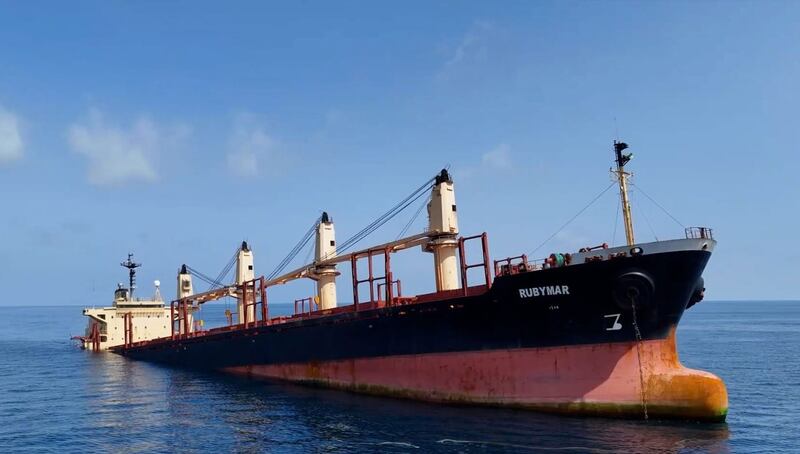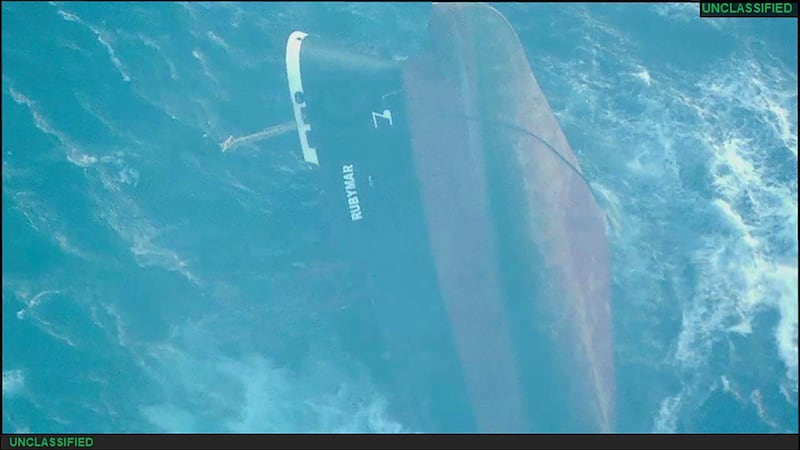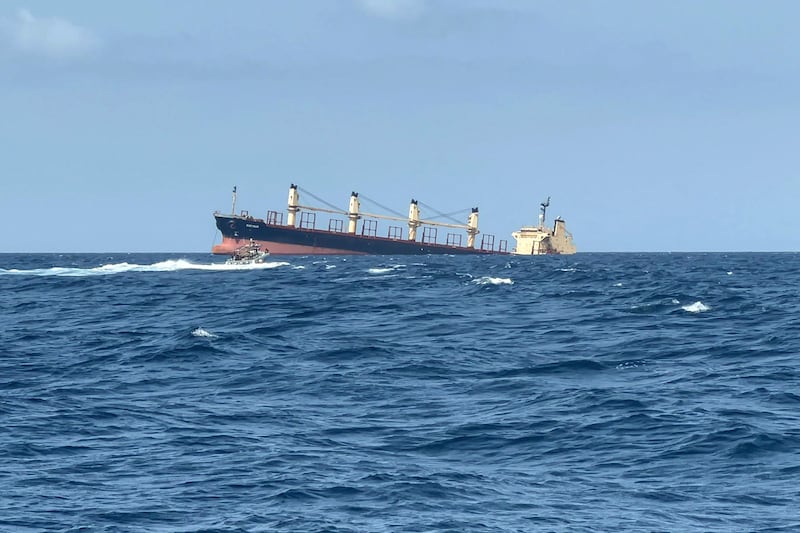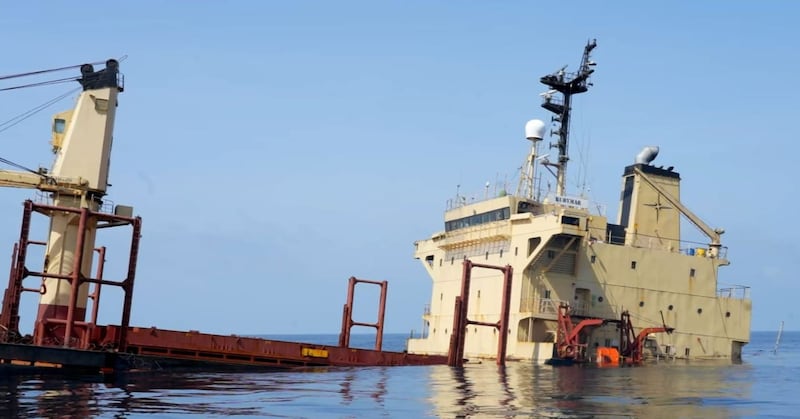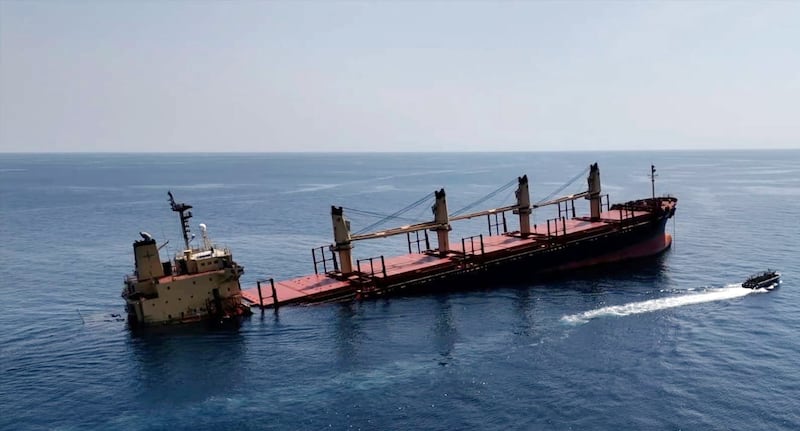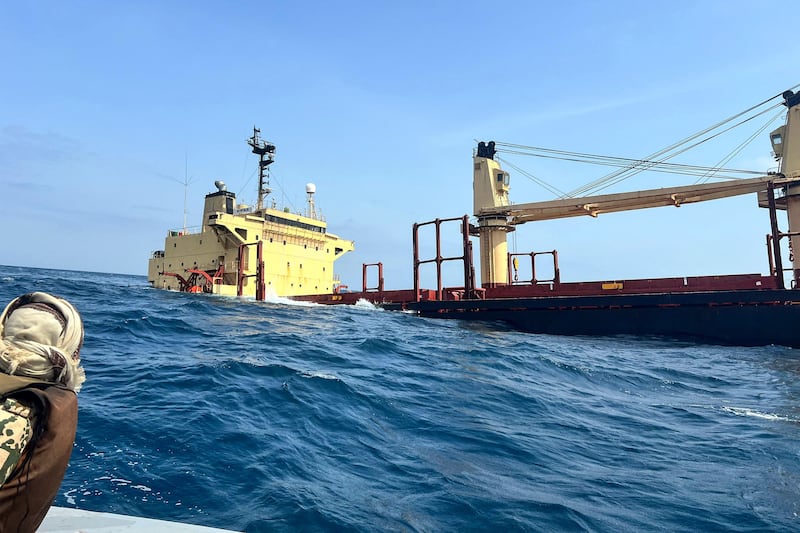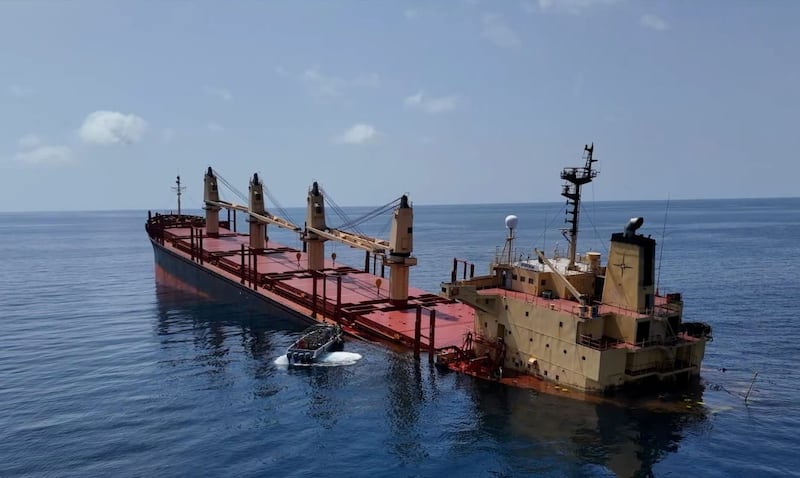Live updates: Follow the latest news on Israel-Gaza
The sinking of the UK-owned bulk carrier Rubymar after a Houthi missile attack off the coast of Yemen threatens to further delay the global shipping industry’s recovery and heighten the worsening security risks at Bab Al Mandeb.
The incident, which marks the first vessel lost since attacks on Red Sea ships started in November, will force shipping companies to continue relying on the expensive and lengthy reroute around the southern tip of Africa, analysts say.
“This incident will do nothing to ease the concerns of ocean freight carriers, so it is likely the diversions around the Cape of Good Hope in Africa will be in place for the foreseeable future,” Peter Sand, chief analyst of freight platform Xeneta, told The National.
“This incident demonstrates the ongoing danger for vessels transiting the Red Sea and Gulf of Aden and why the majority of ocean freight container ships are continuing to avoid the region.”
Bab Al Mandeb is a critical strait connecting the Gulf of Aden to the Red Sea.
However, the long and expensive detour around the Cape of Good Hope has raised freight shipping prices amid transport delays that could lead to higher consumer prices for some goods.
The latest ocean freight shipping rates data by Xeneta shows that while rates softened slightly in recent weeks, they are still significantly up compared to mid-December when the escalation in the Red Sea began.
Freight rates jumped 164 per cent on March 3 to $4,954 a 40-foot container (FEU), compared with $1,873 on December 14 for routes from the Far East to the Mediterranean, according to Xeneta. These rates are for container ships rather than bulk ships such as the Rubymar.
The rates similarly rose 164 per cent on March 3 to $4,034 a FEU, compared with $1,526 on December 14, from the Far East to North Europe.
“This incident further delays any near-term relief to cargoes taking an alternate route,” Junaid Ansari, head of investment strategy and research at Kamco Invest, told The National.
“This could impact global inflation as the bulk of the shipping carriers would avoid taking this shorter route resulting in higher costs, higher demand for crude oil in the shipping sector, as well as [a] higher risk premium on crude oil and energy prices.”
In February, container prices rose by 10 per cent in north-east Asia, 7 per cent in Oceania and 2.5 per cent in South-East Asia, remaining stable in North America, shipping platform Container XChange said in its latest market report on Monday.
However, prices declined in Europe by about 5 per cent to 7 per cent, 5 per cent in Japan and Korea and 2.4 per cent in the Middle East and the Indian subcontinent region, it found.
Major shippers and operators have suspended operations in the Red Sea – a vital maritime route – following attacks on commercial shipping lines by Yemen’s Houthi rebels.
About 12 per cent of seaborne oil trade and 8 per cent of liquefied natural gas passes through Bab Al Mandeb.
Houthi rebels in Yemen began attacking commercial vessels to express solidarity with the Palestinians in the Israel-Gaza war.
The Iran-backed group show no signs of retreating despite the US and western allies attempting to deter the group with air strikes.
This has severely disrupted trade routes, resulting in longer transit times and affected the bottom line of shipping companies, which have, in response, raised their rates to cope with losses.
With the sinking of the Rubymar, container ships will continue to find alternative routes, according to maritime consultancy Drewry.
“The incident re-emphasises that the Red Sea crisis is not improving and our view is that the vast majority of container ships will continue to avoid the area for the foreseeable future,” said Simon Heaney, senior manager of container research at London-based Drewry.
Global trade ministers and delegates converging in Abu Dhabi last week at the13th World Trade Organisation Ministerial Conference raised concerns about the impact on international commerce from the shipping attacks in the Red Sea, which connects Europe with Asia.
Last week, the UAE's Minister of Economy Abdulla bin Touq said that challenges resulting from the conflict in the Red Sea have highlighted the need for new trade routes as well as investments to redesign logistics and ensure stable supply chains.
Global trade is expected to miss its growth forecast for 2024 as downside risks continue to persist.
On October 5, the WTO forecast a 3.3 per cent growth in global trade for 2024 – a strong improvement on last year's 0.8 per cent – but the projection was made before the Israel-Gaza war that began two days later.
